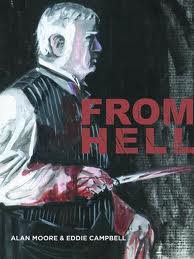Comic Book Classics #24
ALAN MOORE
Arguably the greatest living comic-book writer, Alan Moore (1953 – ) is certainly one of the best known. And funnily enough he lives just down the road in Northampton (where he was born) which is what, 25 miles from Leicester? So very much a local boy done good. I first became aware of him in the 1990s through his graphic novels V for Vendetta and Watchmen, although I’d read his stuff without realizing it in 2000 AD. The Ballad of Halo Jones and DR and Quinch somehow stuck with me, even as I (rightly) dismissed most US and British ‘graphic novels’ as inferior shadows of European ones.
One aspect of his work that stands out (perhaps the most important for me) is the way his comics are grounded in real world issues and are not afraid to tackle politics. V for Vendetta is a diatribe against Margaret Thatcher, Watchmen too is constructed around a critique of repressive impulses among the powerful (Superheroes being nothing more than fascist vigilante fantasies). In his less familiar works this tendency is also clear; ‘Brought To Light’ about conspiracy theories and 9/11, Aargh (an acronym for Artists Against Rampant Government Homophobia), tackled the introduction of clause 28 and latterly Moore has become involved with Occupy Comics – a project by comic book artists to support the UK’s Occupy movement.
Issues of gender are also of particular interest to him. In a medium saturated with unfeasibly endowed superheroines, Alan Moore has collaborated with women artists (most notably Melinda Gebbie, his partner) to tackle the blatant sexism in the medium. Their most notable collaboration; Lost Girls, is an exploration of sexual fantasies from a woman’s perspective. An incredibly beautiful book, it references a great number of images, artists and styles.
Alan Moore is a writer who really understands the peculiarities of the comic book medium; its advantages and drawbacks. His writing is lyrical, literate and evocative, but when required it can be sparse, dense or spartan. In his dealings with big business comics he has specialized in turning round ailing franchises like ‘Swamp Thing’ and the bafflingly popular ‘Batman’. He no longer deals with either Marvel or DC, having fallen out over the adaptation of his work to film and their shabby treatment of artists and writers. A remarkable number of his comics have been adapted; From Hell, The League of Extraordinary Gentlemen, Watchmen, V for Vendetta. Moore, however has disassociated himself from all of them.
Apart from comics, Alan Moore is a published novelist, has written widely on magic (he’s an occultist and a ‘neo-pagan’) and has a long-standing interest in music. His main legacy, however, will be a body of work that showed what comics as a medium could do and what they could be. Sadly, apart from the ubiquitous Guy Fawkes mask (bowdlerized to the extent that it is now used by Tea Party activists), it might just be the film manglings of his work that will endure. It will be a great pity if that happens.
Posted on June 1, 2012, in Comic Book Classics and tagged Aargh, Alan Moore, From Hell, Lost Girls, Melinda Gebbie, Watchmen. Bookmark the permalink. 1 Comment.





I have never really loved, or even hated, anything produced by Gray or Palmiotti and 30 Days of Night, my sole venture into Niles’ work, was underwhelming to say the least. So I bought this book solely on the strength of its concept. An anthology equally featuring serialized creator-owned stories and comics-magazine-style content, e.g. interviews, pictures, etc. Although, as many have commented, the format isn’t exactly novel, the creator-owned hook is what really has caught people’s attentions. As with virtually every form of entertainment, it’s incredibly pervasive for comic book fans to elide a certain key term: industry. The comic-book industry, by all accounts, doesn’t seem to possess the most progressive model regarding labour issues. Like most fans, it’s something I know in the back-of-my-head yet my desire to see Batman hook Superman in the face with a kyprtonite mecha suit ensures that those thoughts stay exactly there – in the background. However, I do want to see comics – as a medium, as a format, as an industry – grow, expand, mutate. In the last three decades it certainly has. The advent of the graphic novel, literary acceptance, the looming spectre of the digital revolution. None-the-less, for those unlucky enough not to be one of the handful of superstar writers, they don’t seem (and this from an outsider’s perspective) to reward their creators commensurate with the blood, sweat and tears that go into production. Enter creator-owned heroes. With this book, these guys are really trying to carve out a new space free from corporate exploitation but also editorial interference. The numbers will tell if this is a successful venture financially, but creatively, it mostly delivers.